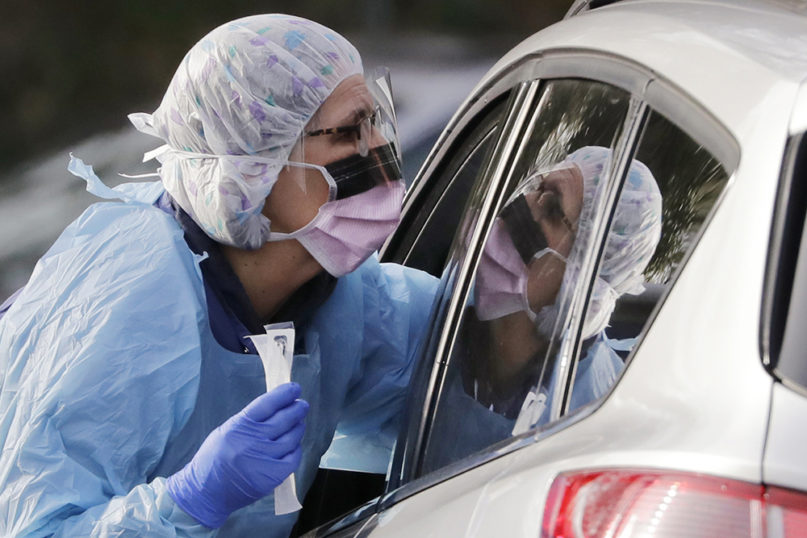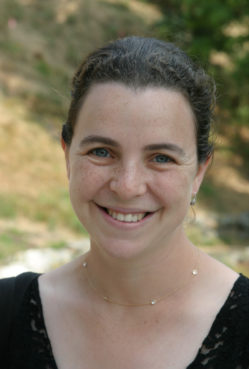PULLMAN, Wash. (RNS) — On a normal Sunday, most of the 100 people filling the pews of the Rev. Lori Cornell’s congregation fit the Centers for Disease Control and Prevention’s description of those at high risk for COVID-19.
So like the majority of churches in the greater Seattle area, Calvary Lutheran Church of Federal Way has suspended its worship services and is turning to technology not only for its weekly celebration of the Eucharist, but for all the pastoral and social contact an aging congregation depends on church for.
But with social distancing and electronic connections come challenges. Cornell is worried older members of her church may become lonesome.
“They have the potential to feel more isolated than ever, so we’re trying to be really mindful of that,” Cornell said. “My concern is for people whose lives very much count on the church and who find themselves often dependent on other people to get them places they need to go, like Bible study, church and other events.”
Her church’s leadership is using Facebook as a way to stay connected, with plans to post homespun sacred music created by church musicians, and leading video chats throughout the week.
For those not technically savvy, the phone has become an important tool, Cornell said.
The Rev. Mike Denton, conference minister of the Pacific Northwest Conference of the United Church of Christ, said the phone tree is being rekindled in his region’s UCC churches too.

Laurie Kuypers, a registered nurse, reaches into a car to take a nasopharyngeal swab from a patient at a drive-through COVID-19 coronavirus testing station for University of Washington Medicine patients, on March 17, 2020, in Seattle. The appointment-only drive-through clinic began a day earlier. (AP Photo/Elaine Thompson)
Because some elderly churchgoers have trouble hearing over the phone, handwritten letters are also being sent to those who are homebound.
“We want to be able to keep folks safe and we don’t want to be a carrier,” Denton said. “So it’s something we’re running into. We don’t know how to move beyond it yet.”
At Kavana, an independent Jewish cooperative in Seattle, Rabbi Rachel Nussbaum said her congregation is tech-savvy, to judge from last week’s Purim services. Celebrating over the video app Zoom, Nussbaum was joined by some 70 households, in costume on their sofas. “That was more, maybe, than we would have had in person,” she said.
Additionally, she said every member of the congregation is in touch with congregational leadership via email for personal check-ins.
“We’re starting with older members and people we suspect are isolated,” Nussbaum said.

Rabbi Rachel Nussbaum. Courtesy photo
She added that Kavana is continuing to explore other ways to foster closeness, including care package drop-offs, phone calls and letter-writing.
As students are forced to stay home from school, she said, this may be an area where they can volunteer.
Bishop Greg Rickel of the Episcopal Diocese of Olympia said priests are asked to use their own judgment when ministering to the sick or elderly.
“I have a retired priest in isolation right now fighting pretty hard for their health and I’m speaking to them by phone every day,” Rickel said. “So we’re having to do some of this remotely.”
But finding ways to be in community during this time is key, he said.
“Desmond Tutu said the idea of a solitary Christian is an oxymoron. Christianity is communal by its nature,” Rickel said. “For these days what I’m trying to impart to our people is that being communal is to isolate; to keep self away is the communal thing to do.”
At First Church Seattle, the congregational care team is working with vulnerable church members to find the best way to connect digitally. The Rev. Jeremy Smith said the care team is planning to create a hotline so homebound members who aren’t as tech-savvy can call in and listen to services.
The congregation has also been broken into small groups, which are meeting regularly via preferred medium — email, video chat or phone call.
“I have a 70-year-old in a group with a pair of 30-year-olds,” Smith said. “The founder of the United Methodist Church, John Wesley, put people into these types of small groups to check in with each other every week and pray for each other, and guide them toward Christian living, and I think in this digital age with this sort of hands-off — literally — way of living, I think it’s helping people connect with each other and can help sustain even those who are homebound.”
Smith said the church is still trying to figure out how to best care, physically and spiritually, for all members, but especially those who live in a care facility or in Seattle hospitals, which aren’t allowing visitors.
“This is not how things will be going forward. This is a season we’re going through, and when we emerge on other side, we’ll be ecstatic to see each other and high-five each other again, but until then have to find ways to sustain each other and to keep care for each other,” Smith said.






